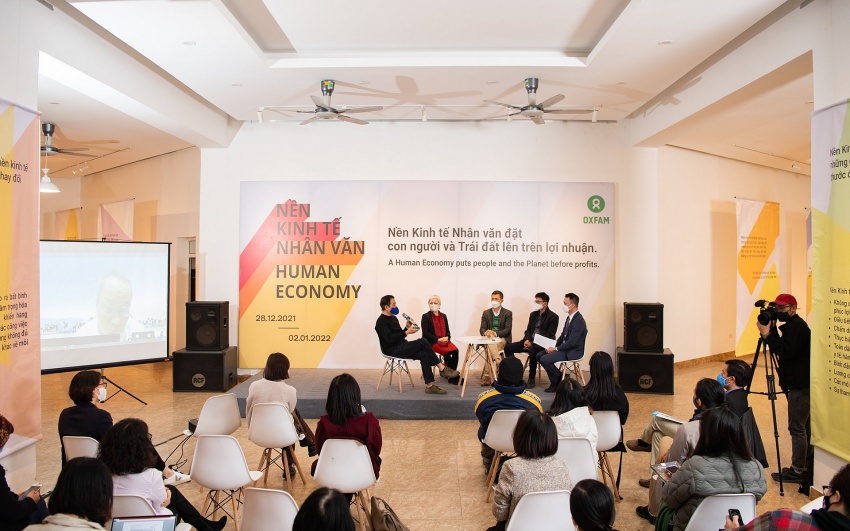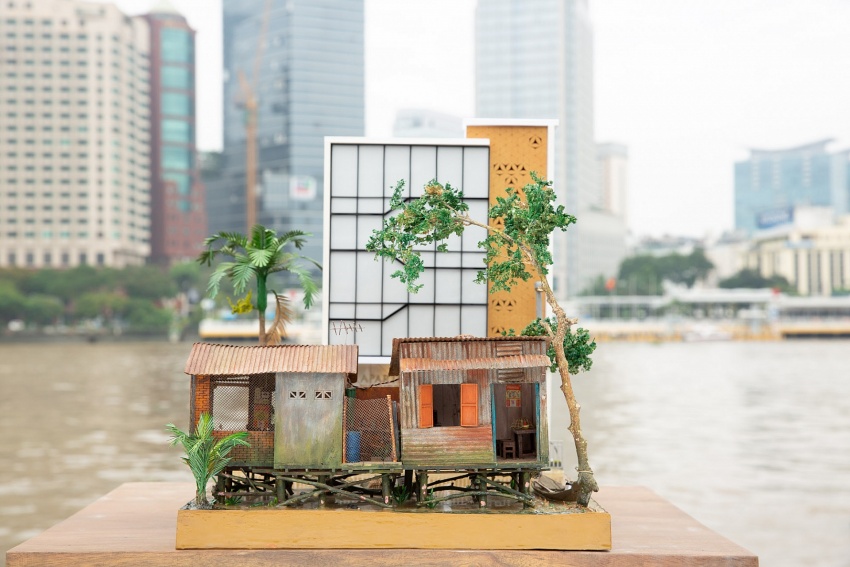Human economy through the art of miniatures
 |
| The human economy in the perspective of normal life through the art of miniatures |
The exhibition faithfully reproduces Vietnamese society. Besides the positive development, another angle on the gap between the rich and the poor, the gap in the quality of education, and the problems of modern cities are also shown through the miniatures. Viewers are reminded of the urgency to build gender equality, universal public services for all, business models for the future, decent work, and other aspects of social development.
This is the first event in the chain of discussions on the necessity of building a human economy that puts people and the planet before profits.
At the workshop at the opening ceremony of the exhibition, experts on social issues discussed the angles of the human economy that focuses on people and the environment, analysed opportunities and challenges of developing the human economy in the country, especially after the pandemic and going ahead net-zero.
The human economy is a new economic model proposed by Oxfam on a global scale to address the gaps of the current economy that is raising inequality and destroying the environment. The use of GDP as a measure of economic development – which ignores numerous factors like the gap between the rich and the poor, the huge assets and profits the super-rich, and environmental issues – is no longer appropriate in the current context.
 |
| A miniature reflecting the difference between the rich and the poor |
Vietnam has carried out reforms and gained impressive achievements in poverty reduction and socioeconomic development over the past decades. From one of the poorest countries in the world, Vietnam has risen to become a low-middle-income country in 2013, with a vision of becoming a high-middle-income country by 2030 and a high-income country by 2045.
"However, Vietnam also faces challenges from increasing inequality among regions and population groups, environmental pollution, impacts of climate change, and economic restructuring to escape the middle-income trap. The lessons learned from developed countries show that inequality will become a hindrance to sustainable and inclusive development," Phung Duc Tung, director of Mekong Development Research Institute said, adding that the current policies of the government are not strong enough to foster innovation and that businesses need to focus on exploiting natural resources to gain more profits, which is causing a lot of consequences on inequality and destroying nature.
"The COVID-19 pandemic has been a wake up call that completely changed the development status of Vietnam. 74 per cent of households have lost their income during the pandemic, with 20 per cent losing all of their income, 24 per cent losing their jobs while the total assets of the six richest people in Vietnam grew $6 billion," said Tung.
In addition to maintaining sustainable and inclusive development before the pandemic, Vietnam is struggling with recovery after two years of COVID-19. The value chains and livelihoods of formal and informal workers, which have been disrupted, need to be restarted in tandem with disease control measures. The economy needs to be revived, but the key sectors for economic recovery such as energy, transportation, construction, agriculture, and industry are the worst offenders in emissions.
Pham Quang Tu, deputy national director of Oxfam in Vietnam said that the human economy puts people and the planet before profits.Instead of belonging to the rich at present, most profits will be spent on public services, public facilities, and social welfare, while the earth and its natural resources and environment will be safeguarded from damage.
The exhibition also provides useful information to improve awareness of social issues such as inequality, universal public service, gender equality, and unpaid care work.
What the stars mean:
★ Poor ★ ★ Promising ★★★ Good ★★★★ Very good ★★★★★ Exceptional
Related Contents
Latest News
More News
- Spring Fair 2026 boosts domestic demand (March 02, 2026 | 16:30)
- Law on Investment takes effect (March 02, 2026 | 16:21)
- Ho Chi Minh City attracts nearly $980 million in FDI in early 2026 (March 02, 2026 | 10:57)
- Businesses bouncing back after turbulent year (February 27, 2026 | 16:42)
- VinaCapital launches Vietnam's first two strategic-beta ETFs (February 26, 2026 | 09:00)
- PM sets five key tasks to accelerate sci-tech development (February 26, 2026 | 08:00)
- PM outlines new tasks for healthcare sector (February 25, 2026 | 16:00)
- Citi report finds global trade transformed by tariffs and AI (February 25, 2026 | 10:49)
- Vietnam sets ambitious dairy growth targets (February 24, 2026 | 18:00)
- Vietnam, New Zealand seek level-up in ties (February 19, 2026 | 18:06)

 Tag:
Tag:


























 Mobile Version
Mobile Version